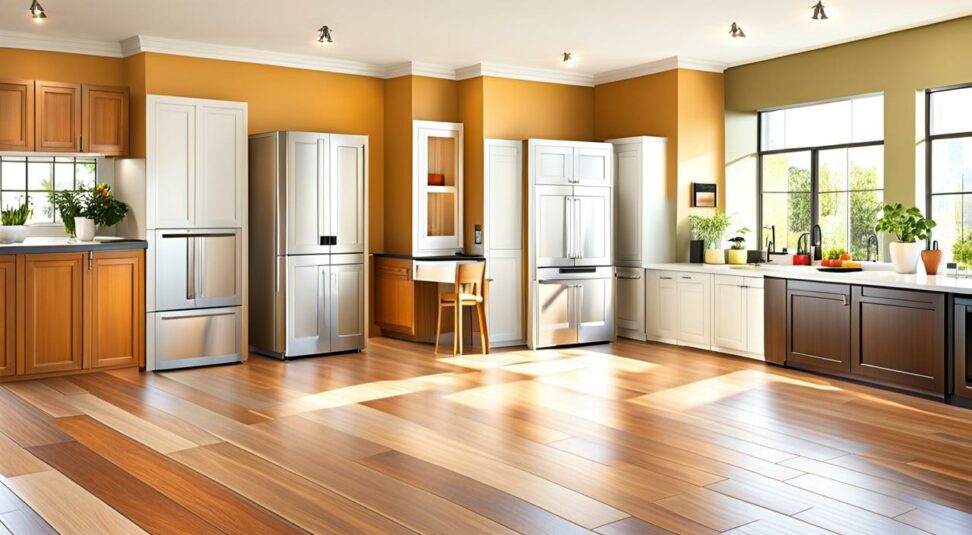Which Kitchen Flooring is Right For You? We Break Down the Pros and Cons
Choosing new kitchen flooring can be an exciting yet daunting process. With so many options to pick from, it's hard to know which type best fits your lifestyle, budget, and goals.
When evaluating kitchen floors, key factors to consider include durability, water resistance, comfort, installation, design, cost, resale value, and sustainability. Prioritizing your needs in these areas will guide you towards flooring that checks your most important boxes.
An Overview of the Main Kitchen Flooring Contenders
Let's start by reviewing some of the leading kitchen flooring options along with a quick snapshot of their defining qualities:

- Tile - Extremely durable and water-resistant but can be hard underfoot
- Laminate - Affordable and easy to install but less durable
- Luxury Vinyl Plank (LVP) - Waterproof and scratch-resistant but lacks wood's value
- Hardwood - Beautiful and adds value but moisture sensitive
- Cork - Comfortable and eco-friendly but expensive
- Concrete - Highly durable but very hard with no cushion
- Carpet - Soft and warm but not moisture resistant
- Linoleum - Budget-friendly and durable but limited style options
How Key Factors Impact Your Flooring Decision
Now let's delve deeper into those key considerations that should guide your kitchen flooring selection process.
Durability and Wear Resistance
Kitchens see a lot of high foot traffic, dropped pots and pans, moving appliances, pet paws, and more. Durability relates to how well a flooring holds up to these daily abuses over time. Options like tile, vinyl, and concrete rate highest for durability and wear resistance.
Water and Moisture Resistance
From spills to boiling water to high humidity, kitchens are prone to moisture exposure. Tile, vinyl, concrete, and other non-porous floors provide the best protection against water damage. Meanwhile, hardwood and carpet are vulnerable when exposed to excessive moisture.
Comfort and Noise Reduction
After a long day cooking in the kitchen, cushioned floors can be easier on feet, knees, and backs. Carpet and cork offer the most softness underfoot. In addition, they provide acoustic insulation that absorbs echo and ambient noise.
Installation and Repair
DIYers will want to consider ease of installation, while budget-focused homeowners should examine repair costs. Tile and vinyl flooring are relatively easy for amateurs to install. Hardwood usually requires professional expertise. In terms of fixes, materials like tile and vinyl again have an advantage over more delicate wood and laminate.
Style and Design Options
Visual appeal plays a big role in kitchen flooring. Tile and hardwood offer the most variety in colors, patterns, and looks. Materials like vinyl and laminate have a more limited style selection in comparison.
Cost and Budget
For homeowners on a tight budget, sheet vinyl, laminate flooring, and low-pile carpet tend to be the most cost-effective options. More premium materials like hardwood, natural stone tile, and cork carry a higher price tag.
Resale Value
Some floors can increase your home's value should you sell. Hardwood is regarded as a premium flooring that boosts resale value. Tile and stone are also neutral valuing additions. Carpet, on the other hand, is known to detract value in kitchens and baths.
Sustainability and Eco-Friendliness
For environmentally-conscious homeowners, renewable and non-toxic floors like cork and linoleum have appeal. On the other end, materials like vinyl are less eco-friendly in terms of production and off-gassing.
Specific Pros and Cons of Top Kitchen Flooring Picks
Now that we've covered the key decision factors, let's examine the pros and cons of specific kitchen flooring materials in more detail:
Tile
Pros:
- Extremely durable and stands up to heavy use
- Moisture resistant and easy to clean
- Available in a huge range of styles and designs
- Adds value by improving kitchen aesthetic
Cons:
- Can be hard and uncomfortable underfoot
- Grout lines prone to staining and discoloration
- Higher upfront installation cost
- Noisy when items are dropped on the hard surface
Laminate Flooring
Pros:
- Very budget-friendly and affordable option
- Easy DIY installation with click-lock planks
- Realistic wood looks and wide style selection
Cons:
- Less durable than real hardwood or tile
- Not water or moisture resistant
- Prone to scratches, dents, and wear over time
Luxury Vinyl Plank (LVP) Flooring
Pros:
- Extremely durable and scratch resistant surface
- 100% waterproof and moisture resistant
- Budget-friendly with low maintenance
- Easy DIY installation with click-locking planks
Cons:
- Doesn't carry the value and resale potential of real wood
- Can show seams and gaps over time
- Not as cushioned and comfortable as other materials
[Additional flooring options Pros/Cons...]
Key Takeaways for Picking Your Kitchen Floor
When it's time to choose new kitchen flooring, keep the following guidance in mind:
- Consider your lifestyle, budget, and goals for the space
- Prioritize moisture resistance for kitchens prone to spills and humidity
- Balance style appeal with acoustic and comfort needs
- Evaluate ultra-durable options like tile, vinyl, and concrete
- Determine if DIY or professional installation is best for your skill-set
- Calculate long term costs, not just upfront price
In summary, there is no universal "best" kitchen flooring for all homes. Choose based on your unique needs and priorities. For most kitchens, durable and water-resistant tile, vinyl, or hardwood tend to provide the winning trifecta of functionality, cost, and aesthetics. Focus on moisture protection above all else in kitchens and baths. With some thoughtful evaluation of the pros and cons, you're sure to land on the ideal flooring solution for your home and lifestyle.